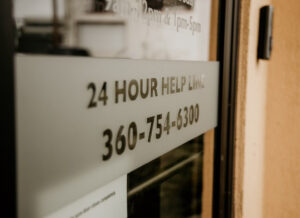When Becky* unlocked the door to her room at the SafePlace Emergency Shelter, she described it as the first time she could remember having a place she could relax enough to rest. Her home life had become so dangerous that she’d taken to sleeping in a car to avoid her partner’s physical abuse.

A neighbor helped her contact SafePlace’s 24-hour helpline, which connected her with both the Shelter and Supportive Housing Programs. Along with a safe room and brand-new sheets and blankets, Becky received groceries, personal care products and a gas card. She told staffers she‘d never before experienced such “great hope that things were unfolding as they should.”
SafePlace’s Crisis Helpline and downtown Olympia Business Office receives over 100 calls and walk-in inquiries each week. Whether in person or over the 24-hour helpline, a screening is initiated by a trained advocate who asks about the caller’s experience of domestic violence and intimate partner situation. They inquire whether incidents of stalking have occurred and whether other lethality factors are present. After a screening and assessment, case-conferencing begins.
For those who qualify, a plan is initiated to help get them (and often their children) to the safety of the shelter. Once there, safety planning begins in earnest – connection with housing specialists and legal advocates, individual and group case management and meeting clients’ specific needs such as childcare and/or job training.
Those who stay at the Shelter at night are supported as they search for work or continue to work, navigate the court process as they seek safety from their perpetrator, access community resources, and keep their children engaged in school activities. They are also free to leave the shelter permanently if they choose.
When fleeing domestic violence and entering the Shelter, clients understandably spend less time in public settings but re-entry into public life is always the goal. During their short stay at the Shelter (up to 90 days) they meet often with staff and advocates who help them develop a safety plan for long-term success.
The plans help clients navigate often-bewildering challenges like enrolling for medical care and insurance coverage and sorting through employment benefit options. Many Shelter clients have never been allowed to make decisions about their family budgeting or medical care or even what groceries to buy. For them, safety planning begins at an even more basic level.
Mental health and emotional empowerment are also integral to client success. We often make referrals for outside therapy and counseling services. SafePlace offers both Domestic Violence and Sexual Assault support groups for those who are interested.
When their time at the Shelter ends, clients continue to receive support through legal and housing programs, case management and other services through SafePlace. Before leaving, they are asked to indicate what level of support, if any, they would like SafePlace to continue to provide.
A troubling trend emerged at SafePlace during the first few months of the pandemic: fewer calls to the Helpline. Staff determined that while people were quarantining in their homes, survivors and their children might still be in dangerous situations, but they had less privacy to make calls reaching out for help.
That trend has since reversed. Calls to SafePlace are now the highest ever recorded. Staff believe a big reason for this increase is that isolation during the pandemic means people spend more time than ever in unsafe living situations.
Domestic Violence and Sexual Assault are so prevalent that it takes far more than one agency to help clients succeed. Every caller to the Helpline caller receives an average of two direct referrals to services such as mental health counseling, substance abuse disorder counseling, and access to basic needs.
Client confidentiality is maintained throughout the process unless the client has consented to having information shared. Otherwise, the only instances in which information may be shared are as mandated reports when a minor child or vulnerable adult are involved.
For over 40 years, SafePlace has been providing people with life-changing tools, resources and interactions. We serve all ages and genders at no cost to the survivor or their children. SafePlace’s primary limitation is, unsurprisingly, a lack of funding. Because the need for support outweighs resources, many of SafePlace’s programs have a lengthy wait list.
| It takes a village for SafePlace to give clients the best chance to succeed. The overall cost to operate the SafePlace 24/7 Emergency Shelter, including full staff coverage and ten bedrooms as well as significant wrap-around resources for participants, exceeds $50,000 per month. Government agencies and programs such as the Washington Department of Social and Health Services, Office of Crime Victims Advocacy, and Thurston County Office of Housing and Homeless Prevention (and several others), provide crucial funding for services. Individual and corporate donors make generous contributions every year. SafePlace also has strategic partnerships with many nonprofits in Thurston County.
In addition to paid staff, SafePlace also relies on trained volunteers for their many 24/7 programs. The Training and Volunteer Coordinator oversees 32-hour Advocacy Core Trainings, which are required for new staff and volunteers. This is generally followed by two to four weeks of shadowing by current staff and volunteers to help acclimate to any new role. Safeplace continues to improve its cultural competency with traditionally underserved populations. We are hiring more bilingual staff, having additional resources for interpretation services (both in-person and telephone), increased outreach to rural populations in and near Thurston County, and significantly increased training for staff in areas of trauma-informed services and anti-oppression work. |
Pat Hughes is Development Director at SafePlace, 521 Legion Way SE in Olympia. The 24-hour helpline is 360.754.6300.
*Becky is a pseudonym. The identity of all Shelter clients is carefully guarded.
Be First to Comment